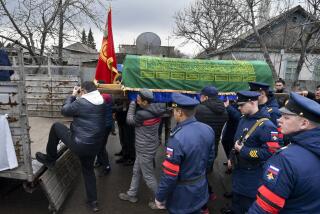Bias Against Gypsies Persists in Europe
- Share via
PLOVDIV, Bulgaria — A small boy shimmies up a utility pole, gingerly grabs an insulated cable pulsing with high voltage and connects it to his home: a cube of corrugated iron sheets in Bulgaria’s largest Gypsy slum.
For the 40,000 people living in squalor in the ramshackle Stolipinovo ghetto on the outskirts of Plovdiv, it has come to this: Their electricity was shut off because they couldn’t pay their bills, so some have resorted to stealing it.
“We had to light candles. We had to heat with a wood stove. We had to eat dry food and sausages because we couldn’t cook,” said Atanas Angelov, a 73-year-old Gypsy barely making ends meet in Bulgaria’s second-largest city.
“Like most of my neighbors, I’m in despair,” he said. “There’s nothing we can do. We’re powerless.”
From Budapest to Bucharest, from Plovdiv to Prague, life for eastern Europe’s 5 million Gypsies is no easier in the new millennium than it was in the last one. Amid a growing sense of misery and desperation, some fear the seeds of future conflict are taking root.
In Romania and Yugoslavia, police routinely abuse and harass Gypsies, the U.S. State Department said recently in its annual human rights report. In Slovakia, the Czech Republic and Croatia, far-right skinhead gangs regularly terrorize Gypsies, who are also known as Roma. Across the east, half of all Gypsy children never attend school or are forced into institutions for the mentally deficient, the group Save the Children says.
“No one is doing anything for the Roma, and that has to stop,” said Antonina Zhelyazkova, who heads the International Center for Minority Studies and Intercultural Relations in Sofia, Bulgaria’s capital.
This formerly communist country can’t even agree on how many Gypsies it has, never mind how to help them.
Officially, there are 350,000 in Bulgaria. But because many call themselves Turks at census time, the real number is more like 650,000, or 8% of the population, Gypsy activists contend.
Of the 240 seats in parliament, Gypsies hold only two.
Nine in 10 Gypsies are jobless. Many Bulgarians accuse them of being too lazy to work; Gypsies say no one will hire them.
Krum Mihailov, 32, is an unemployed cook who has been scouring Plovdiv’s newspapers for jobs. He said he found one, called the restaurant to make an appointment and realized he was the only person to apply. His hopes soared, only to be dashed.
“They took one look at me and said, ‘No, the job is taken,”’ he said. “Once they see we’re Gypsies, they don’t even want to talk to us.”
Plovdiv is an ancient town on the Maritsa River where Turks, Gypsies, Jews and Bulgarians have lived in harmony for centuries, but frictions are intensifying.
The local utility company has shut off electricity to the Stolipinovo slum several times this year because Gypsies aren’t paying their bills, prompting some frustrated Roma to pelt rocks at the lighted windows of their Bulgarian neighbors.
Although the Gypsies reached a deal with city officials, it’s not an easy one: Half of each family’s monthly aid of 74 leva ($33) will be applied to their bills in return for the city’s switching the power back on to their shanties.
“These problems originate with the Gypsies’ way of life,” said Plovdiv’s mayor, Ivan Chomakov. “Let’s face it, no one likes to pay his bills, but poor Bulgarians pay theirs. There’s a lack of values in the Roma community. They have to play by the rules.”
For many Gypsies, those rules changed dramatically in 1992, when Bulgaria enacted a “restitution law” returning to private hands the lands that were seized by the state under communism.
Gypsies had to leave their modest homes and their jobs growing vegetables on state collective farms, where women got prenatal care and contraceptives and their children got hot meals at school, many making it at least to the eighth grade.
Illiteracy, which was 9% among Gypsies in 1995, has doubled to 18%. Life expectancy has dropped: The average Bulgarian lives to age 69; the average Roma to 55.
“Bulgarians got their land--but now the Gypsies have nothing,” said Zhelyazkova, the activist. “Our politicians turned the Gypsies into thieves.”
Many Gypsies tend to have large families--households of 15 or 20 aren’t unusual. They say they’re caught in the cruelest of vicious circles: Because they’re unemployed, they can’t afford to send their children to school, and without an education, their children won’t find work.
Although the city of Plovdiv employs about 250 Gypsies as street sweepers, prospects are poor for the rest.
Some beg, like the man in Sofia with both legs amputated below the knees, who tapes large foam pads to his stumps and hobbles between two lines of traffic with his palms outstretched. Or scavenge, like the elderly woman in rags in Stolipinovo who picks through garbage in a gutter.
Anton Karagyozov, who runs a Gypsy foundation in Stolipinovo, warns that if conditions don’t improve, social tensions will rise. “There could be a catastrophe in the next 10 or 15 years.”
Things have never seemed so bleak, agrees Asen Kolev, a Gypsy scholar and philosopher in Plovdiv.
“If we’re not careful, the gap between us will widen,” he said, “and we’ll never be able to live together anymore.”
More to Read
Sign up for Essential California
The most important California stories and recommendations in your inbox every morning.
You may occasionally receive promotional content from the Los Angeles Times.












